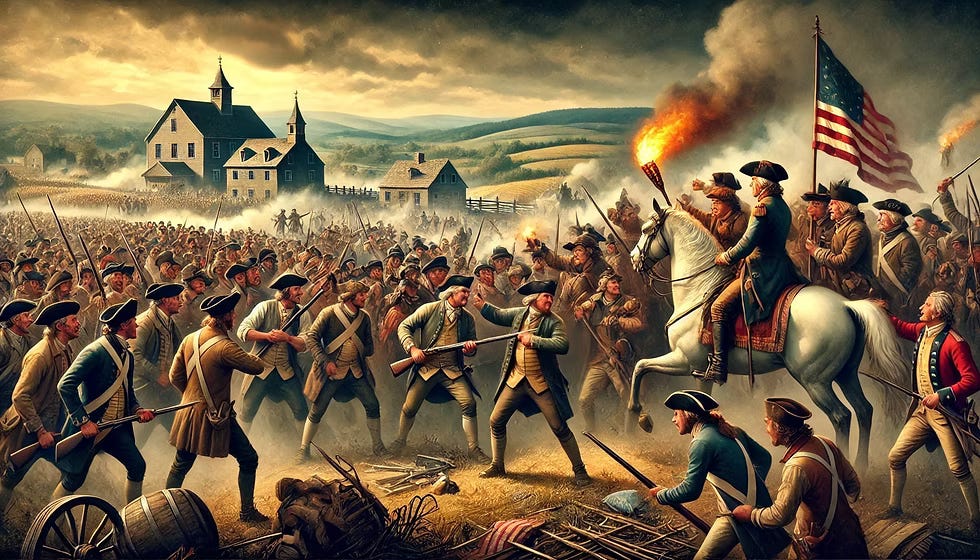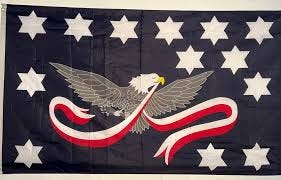Don Surber
Trump is doing what Washington did
Saturday marked the 231st anniversary of George Washington’s final battle.
As president and commander-in-chief, he led roughly 13,500 militia men from Pennsylvania, New Jersey, Maryland and Virginia to Carlisle, Pennsylvania, to confront 600 rebels and moonshiners. Despite the painting, it wasn’t much of a battle but more like Washington (and 13,500 soldiers) staring down armed protesters.
The rebels refused to pay the whiskey tax imposed by Alexander Hamilton to pay off the debt the northern states had run up in the Revolutionary War.
Southern states, too, had debt but not as much so they opposed the federal government’s assumption of the debt, as it was known at the time.
James Madison, Thomas Jefferson and Hamilton cut a deal over dinner on June 20, 1790.
In exchange for the federal government assuming responsibility for all the states’ debt, Congress would move the capital from New York City back to Philadelphia for 10 years and then finally to a location in the South.
The states of Maryland and Virginia generously donated swampland surrounding the Potomac and Anacostia rivers for this District of Columbia. The Lee family just happened to own land in Arlington adjacent to the swamp. Senator Charles Carroll’s 12,000 acre estate bordered on the Potomac near Frederick, Maryland.
Now it was just a matter of draining the swamp and building a city. That and raising $25 million to pay off the debt. Odd isn’t it that we formed a government and the first thing Congress did was run up the national debt and help political insiders.
So who would pay the debt? Eastern distillers and farmers in Appalachia who—as Felice and Boudleaux Bryant wrote in their song Rocky Top—get their corn from a jar. Rye, barley and wheat also are widely used in whiskey depending on the distiller’s tastes and crops.
A grandfather of my wife ran the biggest still in Calhoun County, West Virginia, back in the day. Moonshine is made to avoid taxes, not prohibition. Counties are dry to protect moonshiners from outside competitors.
A gallon of whiskey was worth a buck in 1790. The tax was 9 cents a gallonfor small producers and only six cents for large distilleries.
The hillbillies, or if you prefer the more formal Mountain Williams, had other grievances as well.
I stole the Mountain Williams line from Bugs Bunny. Please subscribe anyway.
Upgrade to paid
Mount Vernon’s take on the rebellion said, “These small-scale farmers did not have ready cash to be able to pay the tax and were unable to easily pass on the burden to their customers, like the operators of large distilleries in the East.
“Taken together with feelings that the government in the east was not doing enough to resolve problems with Native Americans, who would soundly defeat an American army at the Battle of the Wabash in the fall of 1791, in addition to the issue of free navigation on the Mississippi River, which had been closed by Spain in 1784, the excise tax fueled an already growing fire of animosity between the frontier counties throughout states.”
The tax was the Obamacare of its age.
However, the rebels were hardly heroes. The History Channel said:
The law was immediately a failure since refusals to pay the taxes were as common as intimidation against the officials hired to collect them. Excise officers sent to collect the tax were met with defiance and threats of violence. Some producers refused outright to pay the tax.
Perhaps inevitably, violence broke out. On September 11, 1791, excise officer Robert Johnson was riding through his collection route in western Pennsylvania when he was surrounded by 11 men dressed as women. The mob stripped him naked and then tarred and feathered him before stealing his horse and abandoning him in the forest.
Johnson recognized two men in the mob. He made a complaint and warrants were issued for their arrest. A cattle drover named John Connor was sent with the warrants, and he suffered the same fate as Johnson. He was tied to a tree in the woods for five hours before being found. In response, Johnson resigned his post, fearing further violence.
Incidents escalated over the next few years. In 1793, the home of Pennsylvania excise officer Benjamin Wells was broken into twice. The first time, a mob of people forced their way in and assaulted Wells’ wife and children.
The rebels had a flag and everything. You can still buy one.
Things came to a head in the summer of 1794. John Neville, a wealthy landowner, helped a federal marshal issues summons to 60 people who hadn’t paid their tax. They would have to travel all the way to Philadelphia 300 mikes away over rough terrain.
A mob showed up at his home on Bower Hill. He started shooting. A man died. The mob dispersed but came back the next day.
The History Channel said:
On July 17, 1794, as many as 700 men marched to drums and gathered at Neville’s home. They demanded his surrender, but Major James Kirkpatrick, one of 10 soldiers who had come to the property to help defend it, answered that Neville was not there. In fact, Kirkpatrick had helped Neville escape the house and hide in a ravine.
The mob demanded that the soldiers surrender. When that request was refused, they set fire to a barn and the dwellings of enslaved people. The Neville women were allowed to flee to safety, after which the mob opened fire on the house.
Following an hour of gunfighting, the mob’s leader, James McFarlane, was killed. In a rage, the mob set fire to other buildings and the soldiers soon surrendered as the Bower Hill estate burned to the ground.
When word got back to Washington, the man not the city, he decided enough was enough. He got on his high horse and went to meet the rebels. The 13,500 militia men he took with him made an impression and the rebellion ended peacefully. Congressman Albert Gallatin sided with the rebels and helped broker the peace.
A few men were tried for treason and juries convicted two of them. Washington later pardoned them.
Jefferson accused Washington of acting like an authoritarian. Two years later, the electoral college chose Vice President John Adams over Thomas Jefferson who became vice president.
In 1800, the two men had a rematch. Jefferson won with a promise to end the whiskey tax, which he did in 1802.
But the first thing he did as president was have Gallatin, now his treasury secretary, go over Hamilton’s books.
To Jefferson’s dismay, Gallatin found nothing and reported, “I have found the most perfect system ever formed. Any change that should be made in it would injure it. Hamilton made no blunders, committed no frauds. He did nothing wrong.”
President Washington in 1794 put down a rebellion and established federal primacy.
Now what is this garbage about President Trump setting an unconstitutional precedent by protecting ICE from a pack of paid pansies in Portland? If sending soldiers to protect federal agents was good enough for Washington, then it is good enough for Trump. |






